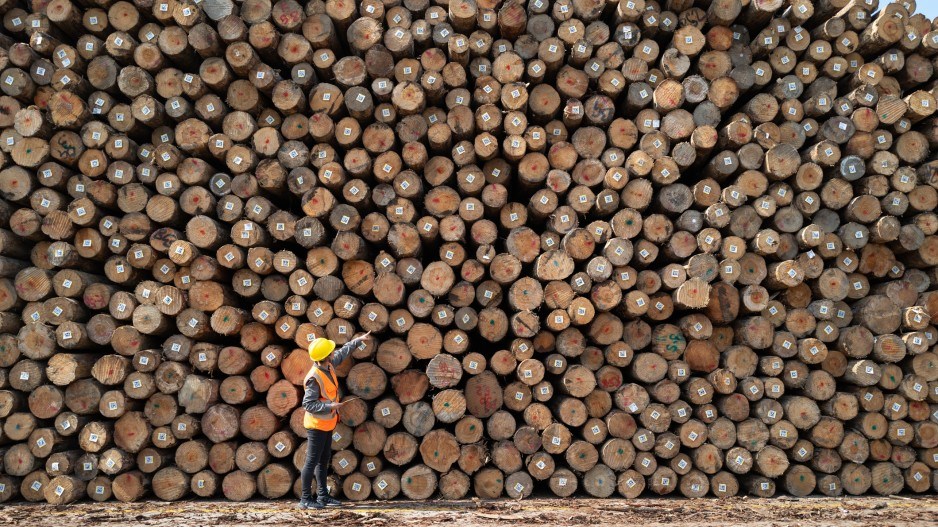B.C.’s forestry sector would have been brought to its knees Friday by new American duties on Canadian softwood lumber, if it wasn’t already flat on its back from being hammered by years of provincial government policies.
The U.S. Department of Commerce hiked the anti-dumping rate to 20.56 per cent, up from the 7.66 per cent rate set three years ago. The total impact on Canadian softwood lumber is expected to be as high as 35 per cent, once the Americans finalize additional countervailing duties on Aug. 8.
B.C. Forests Minister Ravi Parmar called it a “gut punch” for the industry. A more apt description would be kicking forest companies when they’re already down and curled up in the fetal position.
“We're really concerned about the impact,” Kim Haakstad, president of the BC Council of Forest Industries (COFI), told CKNW’s Jas Johal.
“What we're focused on is trying to keep forestry workers employed and communities strong.”
For decades, Canada and the U.S. have fought over softwood lumber, with the Americans repeatedly slapping duties on B.C. wood as part of a long-running trade dispute.
But even before the new duties, B.C.’s forestry sector was in a crisis.
Annual harvest volumes are down by tens of millions of cubic metres, lumber production and exports have shrunk dramatically, export revenues have fallen, thousands of jobs have been lost, and dozens of mills have been curtailed or shuttered.
The industry has blamed various BC NDP policies, including new old-growth logging deferrals, expanded protection areas, a lack of available timber supply, and extraordinarily long permitting delays.
It has also pointedly criticized successive New Democrat forests ministers for stalling out the sector in a push for Indigenous reconciliation, including by mandating forest landscape planning tables with First Nations but not providing enough funding to conclude the work, leaving everyone in limbo.
“We need to focus on what we can control in British Columbia and that's the operating environment for the forest industry here,” said Haakstad.
“We can't wait for the U.S. to act. We need to stop managing the decline of the forest industry and work together with the government to get back to competitiveness.”
COFI called on B.C. to immediately accelerate access to timber, through fast-tracked permitting, expanded salvage operations and additional BC Timber Sales auctions.
That puts Premier David Eby in a bind because he’s already six months into a review of BC Timber Sales—though the review appears to be going so slowly as to be at risk of being overwhelmed by other events.
COFI also called on the province to launch a dedicated permitting team and a single-window permitting system that government is now using in other natural resources sectors, such as mining. The organization wants to see cross-ministry leadership from the province “by aligning environmental, reconciliation, and economic priorities—reducing contradictory policies and delays that paralyze the sector.”
And it wants a boost in funding and support for First Nations to help get land planning done and partner with the sector in new opportunities.
None of this is new.
Forest companies have been calling on the BC NDP to take these actions for years. For the last two, they’ve been met with promises by Eby at industry events that then failed to result in any action.
Parmar portrayed himself as a man of action when he took on the forest minister’s job in November.
“Now is the time to not sit idly by, now is the time to be bold,” he told me last year, adding “you are not going to see a bunch of frameworks and vision statements and grandiose plans” from him.
So far, he’s failed to meet his own bar.
Parmar instead announced a new “forestry advisory council” in May, in partnership with the BC Greens, who are more interested in ecological stewardship than cutting down trees.
And his response to the new U.S. duty increase on Friday was to appoint a new strategic advisor in his ministry, rather than get cracking on any of the long-standing requests made by forest companies, unions and workers.
All of which leads to a pivotal moment for the forestry sector.
If New Democrats are serious about saving the industry from ruin, now would seem to be the time to shelve the never-ending reviews and actually do something.
The government could spin a pivot to pro-forestry policies not as a retreat, but as a made-in-B.C. response to American trade aggression.
Rob Shaw has spent more than 17 years covering B.C. politics, now reporting for CHEK News and writing for The Orca/BIV. He is the co-author of the national bestselling book A Matter of Confidence, host of the weekly podcast Political Capital, and a regular guest on CBC Radio.
🚨New newsletter alert! Stay ahead of the curve in B.C. politics. Get expert political analysis delivered straight to your inbox, plus inside scoops and other stories from across the province. Sign up here for the Capital & Coast newsletter.



